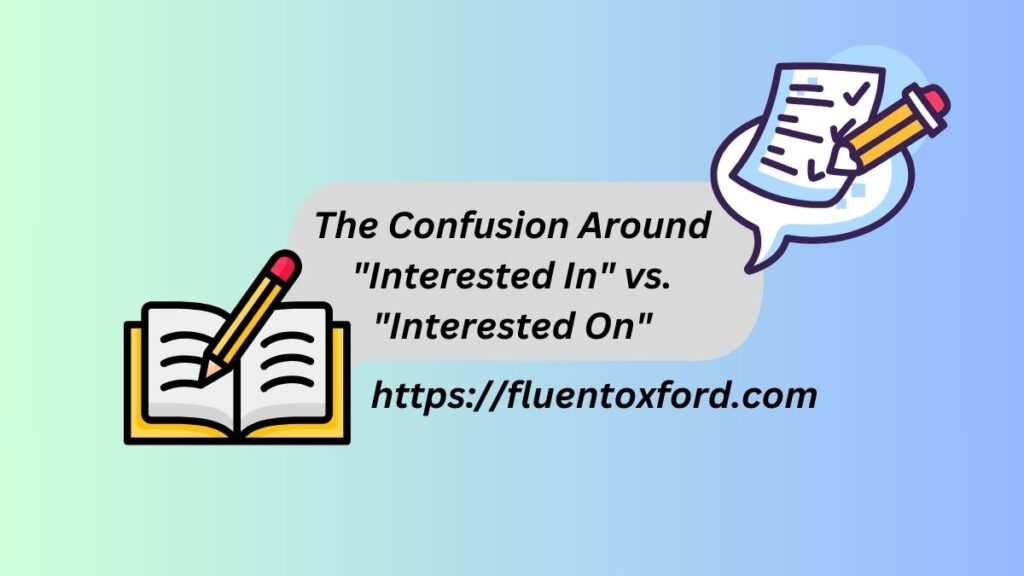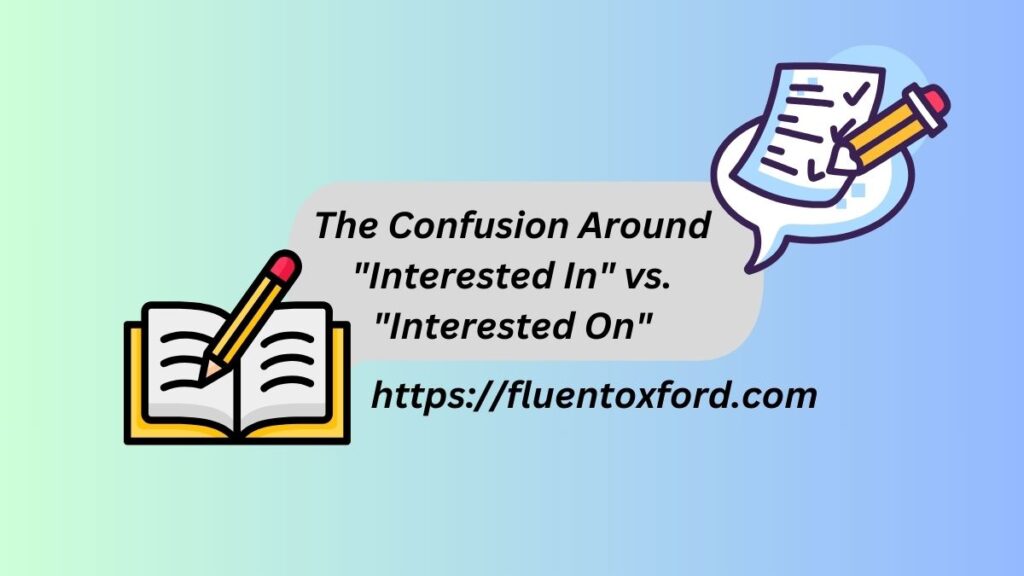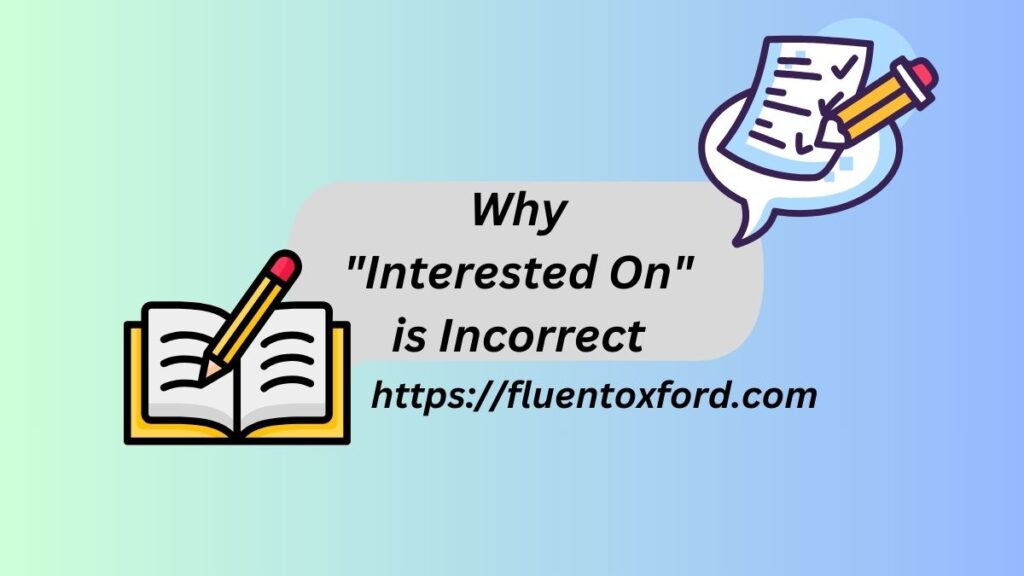“Interested In or On? Mystery Solved” refers to the confusion between the prepositions “in” and “on” when used with the word “interested.” Interested In or On? Mystery Solved refers to the common confusion between the prepositions “in” and “on” when used with the word “interested.” In English, prepositions play a crucial role in sentence structure and meaning, and choosing the wrong one can alter the intended message. “Interested in” is the correct phrase used to express curiosity, passion, or engagement with a subject, while “interested on” is a grammatical mistake that often leads to confusion. Understanding this distinction is essential for effective communication and mastering English fluency.
Mastering prepositions can feel like unraveling a mystery, especially when certain phrases sound correct but aren’t. Many English learners, and even native speakers, stumble over prepositions because their usage is often based on convention rather than strict logic. This subtle yet impactful grammatical rule determines how naturally and correctly one expresses interest. By cracking this mystery, you can refine your English skills and gain confidence in your communication.
The phrase “Interested in or on?” continues to puzzle many, but the solution is simple. The correct phrase is “interested in,” as it aligns with standard English grammar and usage. Whether discussing hobbies, studies, or passions, “interested in” is the proper way to convey enthusiasm. This guide will not only clarify the difference but also help you use the phrase naturally and effortlessly. Get ready to eliminate this common mistake once and for all!
You May Like: Confused By ‘Too Bad’ Or ‘To Bad’? Find Out Now!
The Confusion Around “Interested In” vs. “Interested On”

English learners often struggle with prepositions, and one common mistake is using “interested on” instead of “interested in.” While both prepositions are used in various contexts, only “interested in” is correct when expressing curiosity, passion, or engagement with something. The phrase “interested in” naturally fits when discussing hobbies, topics, or activities, such as “I am interested in music” or “She is interested in learning new languages.” On the other hand, “interested on” is incorrect and not used in standard English.
The confusion arises because different languages have varying prepositional rules, and direct translations can lead to errors.
Many English learners struggle with preposition in usage, especially when it comes to expressions like “interested in.” It’s easy to assume that “on” could be correct because we say, “focus on” or “keen on.” However, “interested on” is incorrect.
Why Do People Make This Mistake?
- Influence from other languages: In some languages, “on” and “in” are interchangeable.
- Prepositional confusion: English prepositions don’t always follow a set logic.
- Lack of exposure: Learners may not hear native speakers use “interested in” often enough.
The goal of this article is to provide a clear, easy-to-understand explanation of why “interested in” is correct and why “interested on” should be avoided.
The Short Answer: “Interested In” vs. “Interested On”
Which One Is Correct?
The correct phrase is “interested in.” When expressing curiosity, passion, or involvement with something, English speakers always use “interested in” followed by a noun or verb in the -ing form. For example, “She is interested in photography” or “They are interested in learning new skills.” This phrase correctly conveys enthusiasm or concern about a topic.
On the other hand, “interested on” is incorrect and not used in standard English. Some learners mistakenly use it due to the influence of other languages or confusion with similar phrases like “on TV” or “on a topic.” However, in English, “interested” always pairs with “in” when describing personal engagement.
To speak and write correctly, always remember that “interested in” is the right choice. Mastering this small but important detail will help you sound more fluent and natural in English conversations and writing.
✅ “Interested in” is the correct form.
❌ “Interested on” is incorrect.
You May Like: Thank You Both Or Thanks To Both Of You: Which Is Correct?
Whenever you talk about curiosity or enthusiasm for a topic, always use “interested in.”
| Phrase | Correct or Incorrect? |
| I am interested in photography. | ✅ Correct |
| She is interested on finance. | ❌ Incorrect |
| They are interested in sustainability. | ✅ Correct |
| He is interested on art. | ❌ Incorrect |
Breaking It Down: What “Interested In” Means

The phrase “interested in” is used to express curiosity, enthusiasm, or involvement in a subject, activity, or person. It means that someone finds something engaging or wants to learn more about it. For example, “He is interested in science” means that he enjoys learning about science. Similarly, “She is interested in playing the piano” shows that she enjoys or wants to learn how to play.
In English, “interested” is always followed by “in” when talking about passions, hobbies, or areas of focus. The structure is usually “interested in” + noun or verb (-ing form)—for example, “They are interested in traveling” or “I am interested in history.” This phrase helps describe what excites or attracts someone’s attention.
Understanding “interested in” and using it correctly makes English communication clearer and more natural. Mastering this simple rule will help you avoid mistakes and improve your fluency.
According to English language experts, “interested in” means having curiosity, enthusiasm, or attraction toward something. It expresses that a person finds a subject, activity, or idea engaging.
Grammatical Explanation
“Interested” is an adjective, and the correct preposition that follows is always “in.” This is because “in” indicates involvement or curiosity.
Examples of “Interested In”
- Personal interests: “I’m interested in art and painting.”
- Education & Learning: “She is interested in learning new languages.”
- Career choices: “He’s interested in finance and investment banking.”
- Hobbies & Activities: “They are interested in gardening and landscaping.”
Tip: If you’re ever unsure, think about the phrase “have an interest in.” Since we say, “I have an interest in photography,” we also say, “I’m interested in photography.”
Why “Interested On” is Incorrect

The phrase “interested on” is grammatically incorrect in English. Many learners mistakenly use it because “on” is a common preposition in other contexts, such as “on TV” or “on a topic.” However, when expressing curiosity or enthusiasm, “interested” must always be followed by “in,” not “on.”
For example, saying “I am interested on science” is incorrect, while “I am interested in science” is the right way to express curiosity about the subject. Avoiding this mistake will make your English sound more natural and fluent. Always use “interested in” for proper grammar and clear communication.
Although “on” is a common preposition in English, it does not work with “interested.”
Why Do People Say “Interested On”?
- Language interference: Some languages use “on” instead of “in” for similar expressions.
- Confusion with other phrases: We say “focus on” or “keen on,” but “interested in.”
If you ever find yourself saying “interested on,” pause and switch it to “interested in.”
You May Like: Infront Or In Front: Don’t Let This Error Slip
“Interested In” vs. “Interested On” – Correct Usage in Context
To clarify further, here are examples showing how to properly use “interested in.”
| Context | Correct Usage |
| Professional | “I’m interested in a job at your company.” |
| Academic | “She is interested in learning about psychology.” |
| Hobbies | “He’s interested in gardening and growing vegetables.” |
| Business | “Investors are interested in finance and market trends.” |
Remember: “Interested on” is incorrect in all these contexts.
Real-World Examples of “Interested In”
- “I’m interested in sustainability and eco-friendly solutions.”
- “Many students are interested in learning about artificial intelligence.”
- “She became interested in photography after taking a class.”
- “He is interested in finance and wants to work at a bank.”
These examples show how native speakers naturally use “interested in.”
Common Mistakes and How to Avoid Them
Many English learners make mistakes with prepositions. Here are some common ones related to “interested in.”
| Incorrect Sentence | Correction |
| I’m interested on sports. | I’m interested in sports. |
| She is interested on technology. | She is interested in technology. |
| They are interested on gardening. | They are interested in gardening. |
Quick Trick to Remember the Rule
- Think of “interest” as a container. You are inside the container of your interest, so you use “in.”
FAQs
Which preposition is used with “interested”?
✅ Always use “interested in.”
Can you ever use “interested on” correctly?
❌ No, it is always incorrect.
Why do non-native speakers say “interested on”?
Because some languages use a different preposition or word order.
How can I answer “What interested you in this position?”
Example: “I’m interested in this position because it aligns with my skills and passion.”
What’s a synonym for “show an interest in”?
- Be curious about
- Be fascinated by
- Have enthusiasm for
Conclusion:
Understanding “Interested In or On? Mystery Solved” makes English learning easier. The correct phrase is “interested in,” which expresses curiosity or passion for something. Using “interested on” is a mistake that many learners make. Now that you know the right usage, you can speak and write with confidence. Small grammar details like this help improve fluency and make communication clearer.
By solving the “Interested In or On? Mystery Solved” confusion, you take one step closer to mastering English. Prepositions may seem tricky, but practice makes them easier. Always remember that interest is in something, not on it. With this knowledge, you can avoid common mistakes and sound more natural. Keep learning, and soon, grammar rules will become second nature.

As an admin at Fluent Oxford, Maida Queen is the driving force behind our vibrant learning community. With a deep passion for English language education, she ensures that our platform remains a dynamic, engaging, and supportive space for learners worldwide.
Maida expertly manages content, assists users with their grammar and fluency queries, and fosters an interactive environment where learning feels effortless and enjoyable. Whether you need guidance, motivation, or just a friendly face in the Fluent Oxford community, Maida is always there to help you reach your English language goals.








